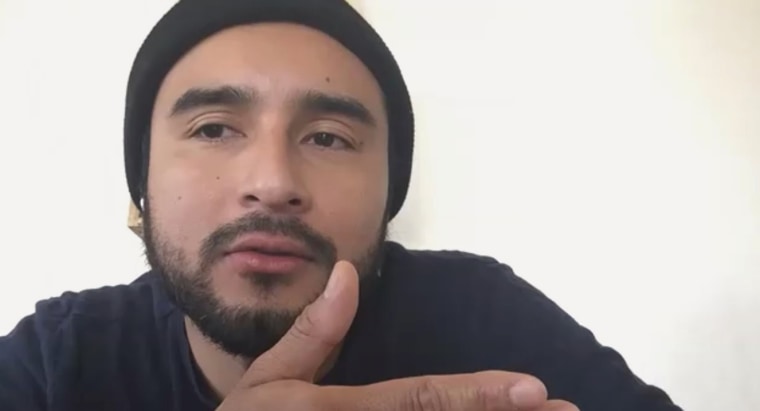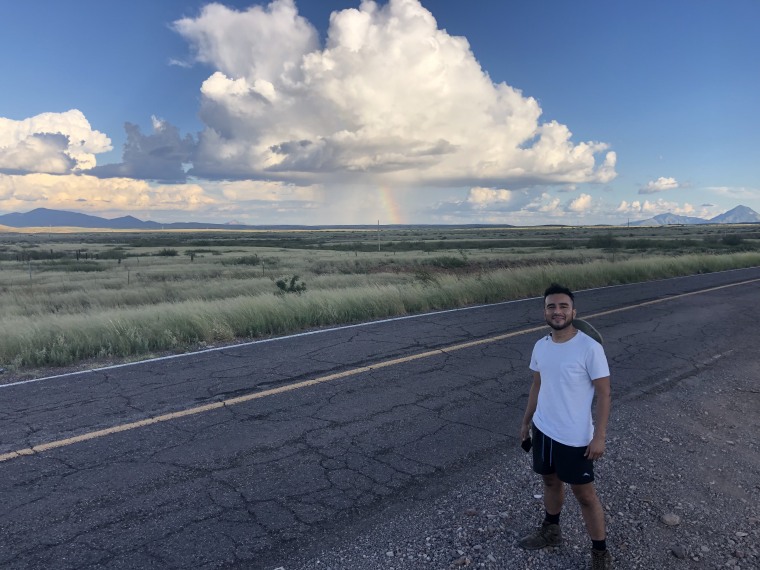At 9 years old, Chepito Zamora had never left La Herradura, the small Salvadoran town where he passed his days playing games and longing for his parents, who had migrated to the United States.
One day in 1999, his relatives began to talk to him about taking a trip to reunite with his parents. It was a journey of 3,000 miles that would take two months — the young boy undertook it as an unaccompanied minor. He learned about danger and hardship but also experienced immense solidarity with the other migrants who traveled alongside him, making the trek on foot, by boat and in cars.
“The memories of those nine weeks have weighed heavily on me during the 20 years I’ve been in this country," said poet Javier Zamora, also known as Chepito or Javiercito, in his acclaimed memoir about his journey. It's called "Solito," which means alone. "Since I started writing this book, the weight has lessened."
Zamora's memoir won the Christopher Isherwood Prize for Autobiographical Prose at the 43rd Los Angeles Times Book Prizes last week.
Zamora said he often remembered how the genesis for "Solito" arose. He was feeling “on top of the world” — he had obtained his permanent residency (he's now a U.S. citizen) and was at Harvard University. In addition, he had just published "Unaccompanied," a collection of poems about his immigration experience.

“I’m tired of my children leaving. My love for you shatters windows with birds. Javiercito, let your shadow return, alone, or with sons, but soon. Call me Mama, not Abuelita,” are some of the verses of "Abuelita says Goodbye," a poem in which he describes a family's separation due to migration.
Zamora, however, felt that something was missing, and was experiencing a feeling of oppression. He went to therapy and through those conversations came the impulse to write his memoir.
“The trauma of that 9-year-old boy is going to stay with me until I die, and that was something I didn’t understand and that I understand much better now. Before writing this book, I wanted that boy to disappear, not to exist. But now that I’ve seen him, that I’ve talked to him and that I’ve remembered everything, I feel better,” he said.
"Solito," which is published in English and Spanish, has drawn wide praise from critics and readers.
“A child doesn’t understand what immigration is, you don’t understand how close to death you are," Zamora said. "Migrant children survive the horror and it’s necessary to talk about that in the immigration discussion, because we are survivors. Perhaps by describing things as a child it will open their hearts more so that they accept that we are human beings."
An important element of Zamora's narrative is the language. The writer strove to delve into his mind as a child, so it's a child who's the protagonist and narrator.
“One day, the therapist said to me: ‘What would happen if you talked to that 9-year-old?’ So I thought, ‘Why don’t you talk like that 9-year-old?’ And I started writing in that tone and I kind of put myself in my own 9-year-old shoes to see the world,” he said, smiling.
Despite the fact that it's been 22 years since Zamora took off on his journey, the migration of children continues as a harsh reality. In fiscal 2022 alone, Customs and Border Protection recorded 152,057 encounters with unaccompanied minors at the southwestern U.S. border, an increase from 2021, when the figure was 146,925.
“It has happened to me that migrant children from El Salvador or Mexico, who came to this country at the age of 13 or 9, have read the book and tell me: ‘I have never told my story to another person because I thought it was the only one,'" Zamora said. "It’s very ironic, because the book is called alone, but we are not alone. This continues to happen because children and adults do not stop coming to this country, as it is literally happening at this minute."
Below is a condensed version of part of the conversation with Zamora.

One of the successes of "Solito" is that despite narrating a dangerous journey, there's room for humor and joy. What was the challenge of achieving that tone during the writing?
Even if one is surviving a very horrible event, sooner or later, you have to smile. One has to figure it out, as we say in El Salvador, so that you don't disassociate from the moment you're living and you can see the future. If you can’t do that, you can’t laugh, you can’t live, and you die because you freeze. And that’s in the book.
Has this book reconciled you with your Central American heritage?
I have one foot here and one foot there, but each time I feel better about it because I will never be 100% from there, nor 100% from here. Before, that made me sad, but it is what it is, that’s how things happened and you also have to accept that by being an immigrant we lose a lot but we also gain a lot.
I’m the only person in my family who can come and go, so that’s a privilege. I can observe things that my family in El Salvador does not understand about life in the United States, and I can tell things about El Salvador to my relatives who live in the United States and have not been able to return. I am like a translator of those realities.
How was the experience of living undocumented in the U.S.?
Another of my traumas is having lived without papers in this country. After I crossed, my parents always asked me not to tell anyone that I wasn’t born in the United States. So for years I have been guilty of lying to other Latinos and telling them that I couldn’t speak Spanish because I didn’t want anyone to know where I came from. I was afraid of "la migra" (immigration authorities) who took many people I knew. But at the age of 17, poetry gave me the courage to say that I am from El Salvador, and that I was an immigrant who didn't have papers.
What use is poetry in a world with as many conflicts as the current one?
Poetry serves to dream of a better world. When writing one can imagine a world without borders, without ecological problems, without gender, which are things that writing deals with. You only need a pen and a page, those are the weapons that any human being has. To change the world, we first have to dream.
Have you seen positive changes in the Latino community?
We are increasingly relevant in all fields, from politics to entertainment, but I think that this is not enough. We have to complicate the conversation. The Latino community has a lot to learn because we are racists too. For example, we still don’t include our Afro Latino brothers and sisters, and that’s a problem we have to fix. You have to update what it means to be Latino and understand that Latinidad is not a race, it is a mixture of everything.
An earlier version of this story was first published in Noticias Telemundo.